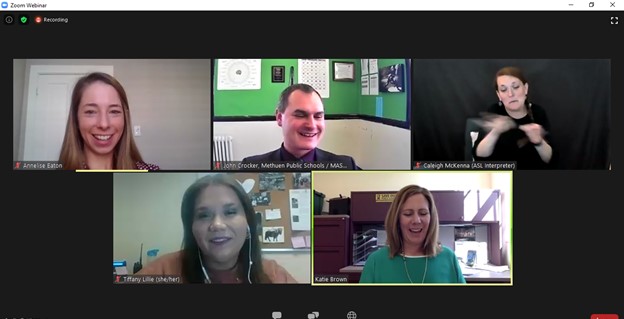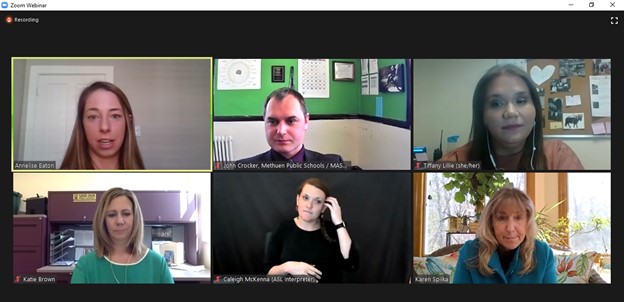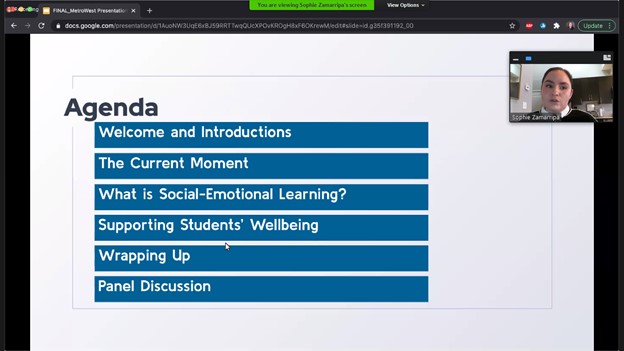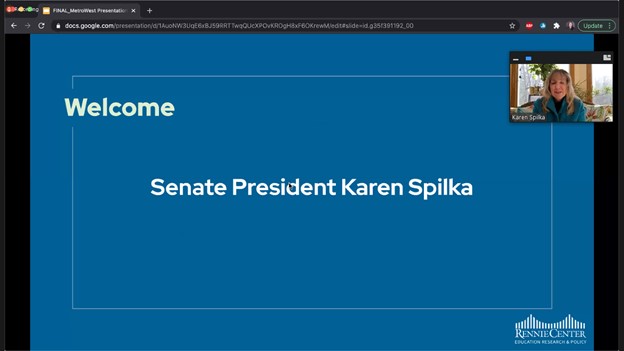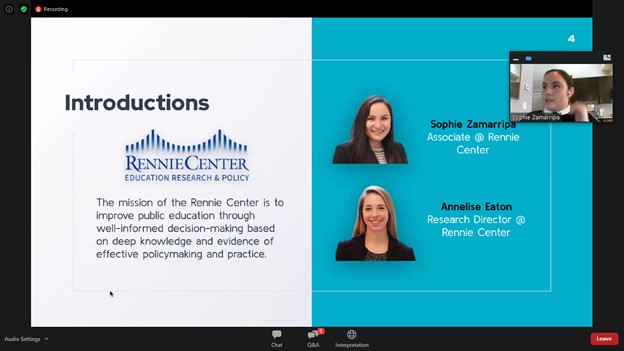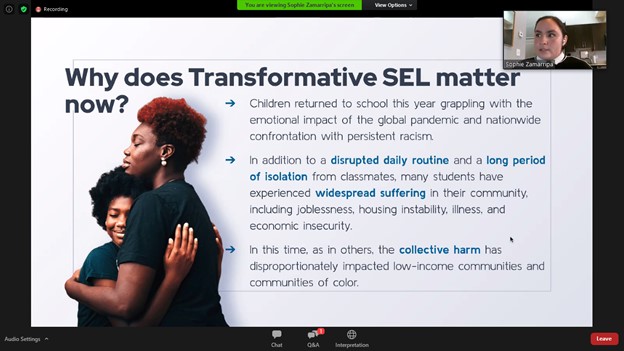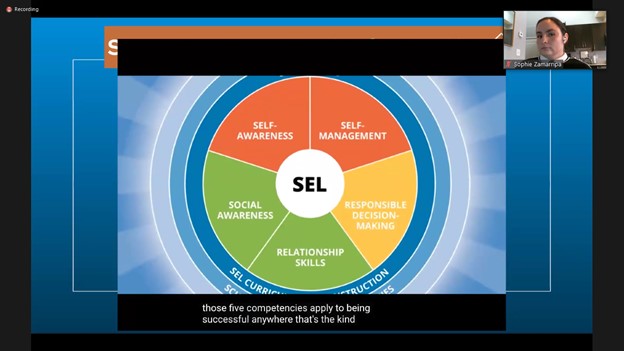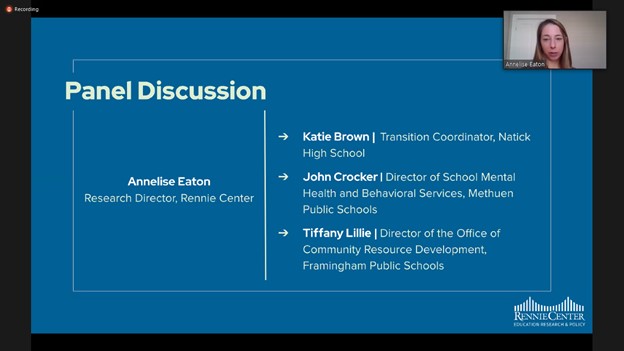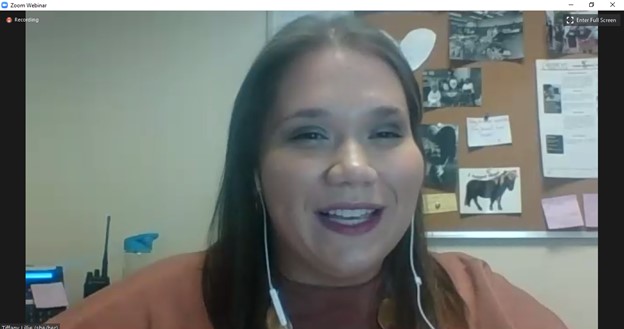.
By Caroline Lanni
***
[broadstreet zone=”53230″]
FRAMINGHAM – For many young people this past year has been the “hardest of their lives,” – due to separation from their peers, the loss of their ordinary routines, and the disappearance of support networks, due to the pandemic, said Senate President Karen Spilka.
“Their anxiety is very real,” said the Democrat from Ashland. “The strongest tools to reduce stress are usually worked on in the classrooms during this time, so “studying at home is affecting students in a number of ways,” said Senator Spilka, speaking at her 4th annual Social Emotional event held virtually on March 19.
This year’s event focus heavily on how to give support to students through COVID-19 and the need this year for social-emotional learning (SEL) both at home in and in the schools.
Spilka organized this year’s virtual event with the Rennie Center. The event featured a panel of professionals from the school districts to talk about what is happening in their own districts including Framingham, Natick, and Methuen.
Senator Spilka said this [SEL] program affects our “youngest to our oldest,” especially during COVID-19.
“Four years ago I began hosting events like today’s annual MetroWest Kids Social and Emotional Learning Forums, each and every year I look forward to these events,” said Sen. Spilka. “In short it’s [SEL] the kind of learning whereby the person gains a greater ability to make their own decisions as they set goals and take charge with their emotions and relationships with others.”
“It’s [SEL] really about helping young people find their way in the world,” said the Massachusetts Senate President.
Sen. Spilka began these forums to show how much a student’s emotional learning plan can be a “strong part of a wider response” in the communities and have more understanding of mental and behavioral health needs for quality care and support “across Massachusetts.”
“As a former social worker the need for these supports across Massachusetts is simply staggering and also personal to me,” she said.
Sen. Spilka talked about her own life growing up with her own father suffering from mental illness, along with herself, her siblings, and mother.
[broadstreet zone=”54526″]
“As a kid I learned because I had to compartmentalize school from home life, which was tough at times,” said Senator Spilka.
“Trauma at an early age literally changes how your brain works,” she said. The consequences are “long lasting.”
The Senate President said she would not be in her position that she is in now without school solubility she received from teachers and a caring guidance counselor – to develop both socially and emotionally during that time.
“The need for Mental and Behavioral Health affects all of us – not only across the Commonwealth, but across the country,” said Sen. Spilka.
“Responsible decision making, empathy and a healthy relationship, recognition of one’s own emotions, and understanding one’s own idea of success in life are all things that are harder for kids to naturally work on right now, or for educators it is almost impossible for them to transmit it through a computer screen,” said Senator Spilka.
There are things as parents, educators, and active community members can do to assist and implement [SEL] in the communities, she added.
Panelists for the virtual event included Framingham Public Schools Director of Community Resource Development at Framingham
Public Schools Tiffany Lillie, Natick Public Schools Transition Coordinator at the Office of Student Services Katie Brown, and Director of School Mental Health and Behavioral Services at Methuen Public Schools John Crocker.
These panelists give the community “guidance as to what is happening on the ground in our schools,” and help us all better understand topics on [SEL,] and committed to supporting student mental health, said Senator Spilka.
[broadstreet zone=”58893″]
[broadstreet zone=”70107″]
The Rennie Center “is an independent non-profit education research and policy organization in downtown Boston,” said Education Research and Policy Associate Sophie Zamarripa.
The mission of the Rennie Center is to, “improve public education through well informed decision making based on deep knowledge and evidence of effective policy making and practice,” said Zamarripa.
“My experience working with social emotional learning has been working with school districts across the country as a consultant, evaluating programs and practices within districts that serve students’ social, emotional and behavioral needs,” she said.
Zamarripa started the presentation addressing “The Current Moment” were all living in now due to the impact that COVID-19 has made such as, collective, and individual trauma, disrupted routines, and academic learning loss.
“The entire world has felt an effect of trauma for students, families, educators, communities, and more. In particular COVID-19 has added to the deep layers of trauma and depression felt among marginalized communities making it essential for schools to apply an equity lens alongside trauma sensitive and feeling centered practices,” said Zamarripa.
Students of color experience racial trauma from their schools and communities and have been “disproportionately impacted by the COVID-19 crisis,” since in Massachusetts the Black and Latin X residents have experienced a significantly higher rate of COVID-19 infections than white residents, she explained.
“When we are implementing trauma sensitive practices educators must recognize the differentiated impact of trauma on communities, families, and students of color,” said Zamarripa.
[broadstreet zone=”61074″]

Zamarripa talked about how trauma can be shown in different ways.
One being academic difficulty, “children who have experienced trauma may experience difficulties with memory, organizational skills, and verbal skills. As well as behavioral changes – such as withdrawal – and aggression,” Zamarripa said.
Children might have difficulty trusting adults and peers and lack appropriate social skills to develop relationships, “which is really vital to their success in school,” Zamarripa said.
Next, we have experienced disrupted routines said Zamarripa, because COVID-19 has caused a widespread disruption of everyone’s lives for work, home, and school students have experienced changes in their schedules.
“These changes can mean a loss of skills gained during schooling or out of school time and they can lead to increased anxiety, depression, and behavioral needs not only among students but their families as well,” said Zamarripa.
Highlighting the learning loss happening now, she called it a “COVID slide,” which is a continuation of the term of their summer slide that talks about how long students are out of school and lose some of their learning they gained in the previous year.
This term [COVID slide] is understood in terms of descriptions felt within different student groups, she added.
[broadstreet zone=”61075″]
[broadstreet zone=”59948″]
“While white students enter the school year with one to three months of learning loss in Math students of color lost three to five months and those trends are expected to continue through the end of this school year when students on average are expected to lose five to nine months in Math,” said Zamarripa.
Many educational leaders have made apparent that schools need to address the learning loss the students are experiencing due to the COVID-19 pandemic, said Zamarripa.
Those policies that schools could implement are, extended summer schools, year-round learning, grade retention, online and in person tutoring, and boot camps to help with the increased learning loss due to the pandemic and make up “loss ground,” she said.
The Rennie Center understands how much [SEL] plays with students’ comfortability to learn in schools,” said Zamarripa. “A wide body of research shows that the single best thing schools can do to help young people persevere through the COVID-19 pandemic to build and strengthen relationships with them.”
Social emotional learning is so important right now because if it is not used to ensure safety then students will not be able to accomplish their goals, she said.
“We need to address this first among our students before we address the learning laws,” Zamarripa added.
“The process through which all young people and adults acquire and apply the knowledge, skills, and attitudes to develop healthy identities, manage emotions, and achieve personal and collective goals. [SEL] also establishes, “supportive relationships and makes responsible and caring decisions – Collaborative for Academic, Social, and Emotional Learning [CASEL.]m” she explained.
Transformative [SEL] is, “A process where students and teachers build strong, respectful relationships founded on an appreciation of similarities and differences and learn to critically examine root causes of inequity and develop collaborative solutions to community and
social problems,” she explained.
This [Transformative SEL] matters now according to the Rennie Center because COVID-19 has made children returning back to schools dealing with the “grappling with the emotional impact of the global pandemic and nationwide confrontation with persistent racism, Zamarripa added.
Schools and communities need to support students’ wellbeing, she added.
[broadstreet zone=”58610″]
Those strategies consist of building a sense of belonging, supporting student voice and agency, developing meaningful family partnerships, and social emotional learning at home.
The presentation addressed, building a sense of belonging, “Transferring normal classroom routines and rituals can be a useful strategy to offer consistency and build trust and confidence with a remote learning environment. This can include morning circles, weekly themes, and
periodic check-ins.”
The presentation also addressed building a sense of belonging, the need for mentorship programs, and affirming student identity.
The Rennie Center showcased how schools can support student voice and agency by providing opportunities for students to impact their community, provide voice and choice in the classroom, and provide voice and choice at the school level by collaborating on decision making, explained Zamarripa.
“In a recent poll a majority [57%] of parents reported that remote learning has had negative emotional impacts for their children,” said Zamarripa.
Educators should help families understand their child’s academic and nonacademic needs. To do this there needs to be two-way communication, create a range of opportunities for family involvement and connection, and give families the tools to incorporate social emotional learning at home by self-care, and actively listening, said Zamarripa.
social emotional learning consists of five sections that make it up which are, self-awareness, self-management, social awareness, relationship skills, and responsible decision making, said Zamarripa.
Strategies to use at home for social emotional learning from the presentation focused on the concept of “Play Every Day,”
“There are many activities that can get kids moving while teaching them social-emotional skills that are essential to helping kids combat stress and anxiety associated with the pandemic,” she said.
[broadstreet zone=”59946″]
Other strategies consist of establishing household and remote school rules and procedures, building a family charter to share how you or everyone in your household is feeling and engaging in creativity together, and modeling the behavior you seek to see in your children.
“Don’t go it alone, reach out to your child’s teacher and school leader to ask for tips and tricks to implement social-emotional learning at home,” Zamarripa said.
“Social Emotional Learning isn’t just for students – adults are in great need in understanding the systems in which they operate, how they impact those systems, and how they are impacted by the systems,” Zamarripa said.
Adults need opportunities to reflect on their own [SEL] and practice their own self-care, by journaling, taking a walk, and understanding the emotions of what is going on especially during the pandemic, she added.
Annelise Eaton, research director at the Rennie Center was the moderator for the panel during the March 19 Zoom event.
Eaton introduced all three of the panelists, Brown, Crocker, and Lillie.
Eaton first asked a directed question to Tiffany Lillie about, how do you balance academic programming alongside social and emotional supports?
“I really think for us it starts at the ground level at relationship building and making sure it is not transactional – that is it rooted at a strength-based approach,” said Lillie.
[broadstreet zone=”59982″]
Towards the work the Framingham Public Schools are working towards, health and wellness, social emotional learning, and anti-racism, Lillie said they make sure, “to take a moment to say what is our intention and what is our impact?”
Lillie said, “Our department lives beyond the bell,” and they make sure to have a full day approach to make sure there is alignment and with other parties such as parents, and other partners.
“The word of the year is pivot – we need to keep responding to that – starting with relationship building on all fronts,” said Lillie.
Last fall when everyone was remote there was a lot of detailed communication between everyone and to make sure they are still checking in and communicating, said Lillie.
And summer school is not going to fix everything and, “we have to make sure our programs are considering their emotional needs, their needs for friendships, and their needs for play and really integrating those in programs that are responsive,” and listening to the students
first, she said.
Eaton then asked Brown a question about how executive function, self-awareness, responsive decision making, and relationship skills
factor into a profile about a graduate?
“We really focused on being a lifelong learner, responsible decision making, and citizen leader, as being the three core areas to focus on,” said Brown.
The “lifelong learner encompasses all the tenants of somebody who has knowledge and curiosity about what they are able to learn, – what you expect from a student,” sid Brown.
The “bulk of their work came down” to the responsible decision maker and the citizen leader, said Brown,

They both “encompass” all those pieces of – self-determination and focuses on making a framework to have a systemic change, said brown.
“We want our teachers to be impassioned by SEL, we want them to see the difference it will make long term,” said Brown.
Social emotional learning needs to show the “forever change it can have on a student,” and that it must be gradual and how teachers should embed this in their learning, said Brown.
“Here in Natick we have been doing a really great job in thinking through that lens, and this year in particular that has been really challenging, but how do we take students to have them have that self-awareness, and how do we investigate themselves, be able to have communications with others that is respectful – full of empathy – and how to have them accept feedback and constructive criticism and move past it and to make a change for themselves,” said Brown.
All of those “things” need to be “explicitly taught,” and there is no specific class devoted to it – “it is happening everywhere,” sid Brown.
The Natick Public Schools employee talked about how she engages with students and asks them if they are self-aware and says that those students who are not sure if they are self-aware, they really are self-aware which plays into SEL tools.
“I think that COVID-19 has shined a spotlight on the areas that we are good at – project based learning, giving kids more decision making because they are at home – putting in power their executive functioning skills, and it has really shown what students who are really struggling,” said Brown.
There are lessons to learn from this “time” and about what they need to do better in the future and who are struggling now with education, future plans, and with the change we are all undergoing, said Brown.
Eaton then moved to a question for panelist Crocker about, “what simple mental health strategies that you would recommend for educators and parents who are just starting out with these types of supports?”

Director of school mental health and behavioral services at Methuen Public School District Crocker said, “that mental health school systems are services and supports for all students to navigate their social environment, accessing support services, understanding how to resolve
conflict, understanding how to navigate their world in an effective way and how to manage stress.”
“We are talking about support for everyone and more intensive support for some of our students,” he added.
We must invest time, energy, and funding for the needs for our students on evidence-based care into schools and for social emotional learning to be taught, said Crocker.
“Absolutely” we should invest in mental health staff and invest time for students to use these resources at the schools, he added.
“It is all well and good to say we care about mental health, it is another thing to do something about it,” said Crocker.
Right now the schools should focus on tending to students’ emotional needs before they “challenge” them in engaging in academic instruction, he said.
You want to avoid the avoidance cycle and stressful situations and break that cycle to get that temporary relief, said Crocker.
“We need to coach our students through that [taking a test] and explicitly talking to them about what strategies that we need to engage in to coach the student through it – help them realize that they can find success with this, and to challenge their thinking that they maybe can’t
engage in this activity,” said Crocker.
[broadstreet zone=”59947″]
Another cycle of isolation and in activity Crocker said to the audience to highlight, “please don’t equate social distancing with social isolation – we have to foster activity with our kids and to make sure they have outlets to be able to engage socially.”
Kids come with different conditions and they need to be ready to provide all care to our kids, said Crocker.
One thing “to do easily” for all their kids is to promote critical thinking skills, he said.
“Ultimately when we don’t provide the mental health services and support – they don’t ultimately achieve the outcomes we want academically and socially – so we need to make that investment,” said Crocker.
Eaton said focusing on academics and social emotional needs – “these things are forever linked, and we need to look at both of them for our students to reach their potential.”
Eaton asked all three of the panelists, “In one sentence we would love to hear what you see as the keys to helping students, families, and communities re-engage with the education system in a way that re-builds trust and pushes the system forward – where [SEL] play a role in this trust building process?”
“I think we have to balance offering students and families grace with accountability,” said Brown.
She added they have asked their families and staff to be so flexible and they need to acknowledge it on a personal level with individual students and individual families and to have a plan to re-build that trust.
[broadstreet zone=”53130″]
“I think that ultimately we need to foster emotional, physical, and academic safety,” said Crocker. Schools need to be “generous” with their flexibility with the students’ academic readiness now and that it is okay to make those mistakes.
“All staff from policy makers, to administrators, to teachers really have to think through and work through an anti-racism lens,” said Lillie.
We cannot ignore the systemic oppression that schools can perpetuate and [SEL] must “live” through that lens and how we [the schools] are reflecting on our own practices to shift towards this anti-racist shell, said Lillie.
Eaton asked the panelists how do we generate strong relationships between schools and families to support Social and Emotional Learning?
“I think it is really listening to a lot of our community partners and a lot of our actual families,” said Lillie.
We must be cautious to align with community partners at this time and listen first and reflect on what families need, she added.
“Schools need to treat families like partners,” said Brown. adding when she is working with a student and she sees that, s the student is
struggling she focuses on communicating with the family to see if they are seeing what she is seeing, and the same goes for the family about what only the family sees as well to communicate to the school about the student.

“We need each other, because the information we are getting might be different,” said Brown.
Eaton asked another question about summer school, and “what is the best option to address social and emotional needs as well as close the learning gap this summer?”
“We have to invest first in our kid’s wellbeing,” said Crocker.
We cannot assume that things are going to go “well” in academics while being in self isolation for a year, so they need to be emotionally ready to learn, he added.
Lillie said, partners in Framingham especially are ready to assist students and have been on the ground the whole time and are ready to listen to students on what they need.
She added, their programs should show what students want to engage in while implementing [SEL] tools.
Brown brought up how they should socially engage, and she said for students they need that instruction again to work in a group and socially communicate with others.
The “highest priority” is to rebuild the skills on how to socially adapt to be in person in schools and if students can’t do that, then the rest is “out the window,” and that is the base of it all, said Brown.
Eaton asked if the schools need more training in mental health?

Lillie said in Framingham they have been talking about this “at a district level,” and they see a lot of needs outside of the building, so they are implementing rap around coordinators this year to do that “nontraditional work.”
Crocker said, “I think we need more staff for sure – not just more staff but, – effectively leverage the staff we have.”
“The national wait time for a kid to get services nationally after they start to experience symptoms is eight to ten years,” said Crocker.
Tat it is “absurd” to take that long and get better at providing these services in the schools and diagnosing their students earlier, said Crocker.
Brown said that for systematic change, there needs to be more training for all staff.
Senate President Spilka was asked how are State policy makers working to address these issues,” towards the issues that were raised from this event?
“We have tried to approach it in different directions and ways, and I do want to start out by saying, if anybody is on this right now or listens to it in the future please contact my office – contact your State Senator, we want to do much as possible. and let us know where there are gaps, and we will work on it.”
Mental and behavioral health has been a real focus for herself and specifically to build up existing programs and services, start new ones, and fill those gaps, Spilka said.

“The Senate in particular took aim at student access to mental health supports in a number of ways – first we designated $3.5 million for a new program to improve a student’s ability to access tele behavioral mental health services mostly during school we know – they have to have every opportunity to engage with school counselors or other social and emotional persons,” said Senator Spilka.
Another issue being a workforce pipeline and needing to attract more people to join mental health professions, she said.
“The most recent State budget introduced a $1.8 million program which will help community centers to recruit more mental health nurse practitioners,” said Senator Spilka.
We need to have a “diverse” workforce, so they “put another $250,000 towards attracting new mental health professionals who are diverse,” and another $100,000 on making sure our “existing mental health professionals are culturally competent to support” other backgrounds, said the Senate President.
“I pushed hard to include an increased factor within the formula itself so more funding will flow to school districts to increase the number of social workers, guidance counselors, and others dealing with this field,” said Sen. Spilka.
The Commonwealth tightened rules on covering insurance on mental health care as well, she added.
More needs to be done and will “continue to amplify your voices on all of these areas, said Sen. Spilka.
“We all need to be positive,” said Senator Spilka. For the young people especially now, “their mental health matters.”
“I will reiterate that I will continue to prioritize and fight for us on this [support structure access],” said the Senate President.
To learn more about The Rennie Center and more about [SEL] and its action guides visit www.renniecenter.org/research/back-school-blueprint
***
Caroline Lanni is a 2021 SOURCE intern. She is a senior at Framingham State University.

